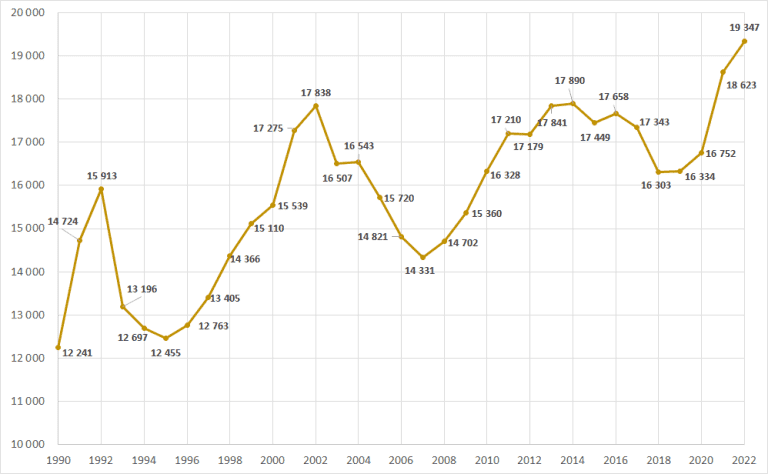Hungarian prison population reaches a 33-year high
Translation is available for this content
Váltás magyarraHungarian prisons are overcrowded again, with the highest prison population in 33 years. The steady increase is worrying: on 31 December 2022, there were more than 19 thousand incarcerated people in Hungary, leaving the prison system at a 107% occupancy rate. The prison population rate of Hungary is very high by European and regional standards.
Number of people in prison on the last day of the year 1990-2022

Source: Hungarian Central Statistical Office and data provided by the National Penitentiary Administration in response to the HHC’s Freedom of Information request
In Hungary, the most frequent crime people are serving a sentence for is theft. In a country where property-related non-violent crimes dominate the structure of crimes, that indicates that inequality and poverty are prevalent in that society.
The Hungarian Helsinki Committee (HHC) has argued for a long time that prison is not the right solution to social problems. Instead, it should be a measure of last resort. The last resort principle is not respected in Hungary these days. Last year there were days when more than 700 people were in prison for petty offences. For example, it would have been easy for a homeless man who celebrated his birthday by eating a cake on the street during COVID-19 to end up in prison for a petty offence if the HHC had not helped him.
It is not only the HHC that warns that the prison system is spiralling into a situation where it is overloaded with tasks that do not belong there. It is a fact, and it has been obvious for a long time that prison conditions deteriorate in any overloaded, overcrowded prison system – and this is clear not only to us but also to national and international prison professionals.
‘First and foremost, overcrowding dehumanises and depersonalises the prisoners and the staff, which is particularly sad because the quality and effectiveness of the relationship between prisoners and staff determine the success of our professional activity, which revolves around reintegration, so overcrowding ultimately makes both the professional environment and the professional work more difficult.’
– wrote József Pallo, a penitentiary specialist academic in his journal article in 2015.
Most prisoners will be released sooner or later. In addition to the state’s duty, it is in everyone’s interest to ensure prison conditions that promote reintegration and reduce the risk of reoffending. Reducing reoffending requires good physical conditions, reintegration programmes and providing appropriate family contact. The fact is that isolation and ostracism have never helped anyone start over successfully.
The HHC has conducted several expert studies on alternative sanctions (e.g. community service, probation, etc.) and their under-utilisation in Hungary. One example is the HHC’s study “Alternatives to Prison: Hungarian Law and Practice on Non-custodial Sentences”, and another is the HHC’s tentative recommendations on the assessment of criteria for sentencing. All the HHC’s research materials on alternative sanctions are available here.
Downloads
- fogvatartottak_szama_Mo_1990-2022 png, 16 KB Download